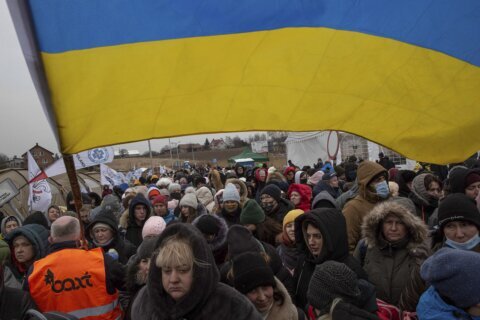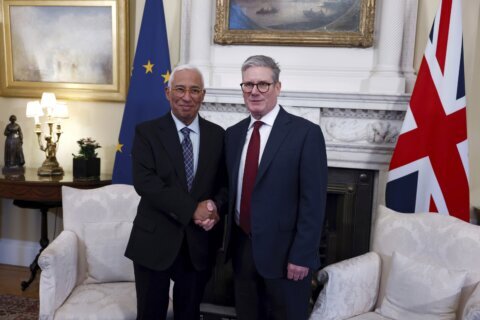Ukrainians living in regions illegally annexed by Russia are being coerced to vote in the presidential election of their wartime occupier, Vladimir Putin — an exercise denounced by Ukraine as an illegitimate effort by Moscow to tighten control over its neighbor.
Polls don’t open in Russia until Friday, but they are open in four annexed regions of Ukraine close to the front line, some of which are not fully in Putin’s control.
The election is taking place under highly distorted and restrictive conditions. Many Ukrainians fled these regions – or were deported by Russia – after Putin’s invasion two years ago, and there are reports of people being forced to vote at gunpoint. There are no international election observers in Ukraine.
The Russian government is prodding Ukrainians with billboards and posters to vote “for their president” and to “take part in the future of our country.” It is promoting the election with a “V” symbol in the colors of the Russian flag — a letter emblazoned on Russian tanks and a clear nod to Putin’s first name.
“ The elections are an extension of military occupation and of the war itself … rather than an exercise in the democratic franchise,” said Sam Greene, a director at the Center for European Policy Analysis in Washington.
In addition to setting up polling stations, Russia has dispatched officials with ballot boxes to people’s homes, saying it is safer for them to vote on their doorsteps.
The Kremlin views the voting in occupied regions of Ukraine as a “test of loyalty” for civilians and local elites, said Volodymyr Fesenko, the head of Penta, a political think tank.
Polls are already open in Russian-occupied Donetsk, Luhansk, Kherson and Zaporizhzhia. In Crimea, which was annexed from Ukraine by Putin in 2014, polls will open Friday.
In the Donetsk region, the Ukrainian mayor of Mariupol, Vadym Boychenko, said his city was a symbol of Russia’s “military nightmare” and of an “electoral process in ruins.” He said a woman “accompanied by two Chechen military men with machine guns” showed up at his neighbor’s apartment with a ballot box and made clear that voting was not optional.
There have been multiple reports of Russian-installed authorities forcing people to vote, and threatening to withhold medical care or other social benefits from those who do not. More than two dozen Ukrainians who refused to vote have been arrested, according to human rights activists.
Analysts say the Kremlin is eager for a high turnout — in Russia and the occupied regions of Ukraine — to signify control, silence dissent and present Putin as a legitimate leader. The Institute for the Study of War said it expects the Kremlin and Russia-installed officials in Ukraine to “fabricate” a high turnout.
The Ukrainian governor of the Zaporozhzhia region, Ivan Fedorov, said that — based on publicly available lists — the Kremlin has brought more than half of the election officials and activists into the region from Russia.
The Russia-installed governor of Kherson, Vladimir Saldo, said Thursday that turnout in early voting was “better than expected” and that lines were forming at polling stations.
In the eastern region of Luhansk, which has been partially occupied since 2014, some residents told The Associated Press that they were going to vote for Putin, although several said they had no idea who else was on the ballot.
“I will vote for Putin, because I don’t know anyone else,” said Veronica, a 30-year-old nurse.
Tatiana, a 20-year-old student, said of Putin: ”I trust him so much that other candidates are no longer suitable for me.”
The AP is not identifying them by their full names because of concerns for their safety.
In a video address on Thursday, Putin urged people in Ukraine’s occupied regions — and in Russia — to vote, telling them that “each of your votes is valuable and significant.”
It is unclear how many people live in the newly annexed regions of eastern Ukraine, where the Kremlin has been accused of resettling Russians. Britain’s Ministry of Defense estimated Wednesday that a third of the pre-war Ukrainian population remains, and analysts said the lack of transparency makes it easy to manipulate the vote.
In February, the Russia-installed governor of Ukraine’s southern Zaporizhzhia region, Evgeny Balitsky, said in an interview that he personally ordered the deportation of pro-Ukrainian citizens, because “these were people who we could not convince and we have to deal with them more harshly.”
Balitsky said “a large number of families” were dropped off near the front line because some of them had insulted Russia’s flag, anthem and Putin.
In Mariupol, which was flattened by the Russian military early in the war, the population has dropped from just over 400,000 people to around 200,000. Half of the current population, according to Boychenko, the mayor, are not Ukrainian and include construction workers and laborers from remote Russian regions. The Kremlin, he said, is trying to repopulate Mariupol “to create a loyal majority out of poor settlers.”
At least 27 people have been arrested for refusing to vote in the occupied areas of Kherson and Zaporizhzhia, according to Pavlo Lysianskyi of the Eastern Human Rights Group.
“The Kremlin is demonstratively increasing pressure on local residents,” Lysianskyi said.
There are also cases, he said, of authorities forcing people to write explanations of their refusal to vote, which could become the basis for initiating criminal cases against them. That practice was also used in local Russian elections held in occupied Ukrainian regions in September.
___
Karmanau reported from Tallinn, Estonia. Burrows reported from London.
Copyright © 2024 The Associated Press. All rights reserved. This material may not be published, broadcast, written or redistributed.







